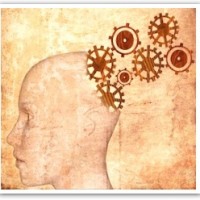Neuroscience wants to be the answer to everything. It isn’t., by Roger Scruton
There are many reasons for believing the brain is the seat of consciousness. Damage to the brain disrupts our mental processes; specific parts of the brain seem connected to specific mental capacities; and the nervous system, to which we owe movement, perception, sensation and bodily awareness, is a tangled mass of pathways, all of which end in the brain. This much was obvious to Hippocrates. Even Descartes, who believed in a radical divide between soul and body, acknowledged the special role of the brain in tying them together.
The discovery of brain imaging techniques has given rise to the belief that we can look at people’s thoughts and feelings, and see how ‘information’ is ‘processed’ in the head. The brain is seen as a computer, ‘hardwired’ by evolution to deal with the long vanished problems of our hunter-gatherer ancestors, and operating in ways that are more transparent to the person with the scanner than to the person being scanned. Our own way of understanding ourselves must therefore be replaced by neuroscience, which rejects the whole enterprise of a specifically ‘humane’ understanding of the human condition.
In 1986 Patricia Churchland published Neurophilosophy, arguing that the questions that had been discussed to no effect by philosophers over many centuries would be solved once they were rephrased as questions of neuroscience. This was the first major outbreak of a new academic disease, which one might call ‘neuroenvy’. If philosophy could be replaced by neuroscience, why not the rest of the humanities, which had been wallowing in a methodless swamp for far too long? Old disciplines that relied on critical judgment and cultural immersion could be given a scientific gloss when rebranded as ‘neuroethics’, ‘neuroaesthetics’, ‘neuromusicology’, ‘neurotheology’, or ‘neuroarthistory’ (subject of a book by John Onians). Michael Gazzaniga’s influential study, The Ethical Brain, of 2005, has given rise to ‘Law and Neuroscience’ as an academic discipline, combining legal reasoning and brain imagining, largely to the detriment of our old ideas of responsibility. One by one, real but non-scientific disciplines are being rebranded as infant sciences, even though the only science involved has as yet little or nothing to say about them.
Read the complete article in CERC.
Nature, nurture and liberal values, by Roger Scruton.
Biology determines our behaviour more than it suits many to acknowledge. But people—and politics and morality—cannot be described just by neural impulse.
Beyond Human Nature by Jesse Prinz (Allen Lane, £22)
Incognito by David Eagleman (Canongate, £20)
You and Me: the Neuroscience of Identity by Susan Greenfield (Notting Hill Editions, £10)
Human beings are diverse and live in diverse ways. Should we accept that we are diverse by nature, having followed separate evolutionary paths? Or should we suppose that we share our biological inheritance, but develop differently according to environment and culture? Over recent years scientific research has reshaped this familiar “nature-nurture” debate, which remains central to our understanding of human nature and morality.
For much of the 20th century social scientists held that human life is a single biological phenomenon, which flows through the channels made by culture, so as to acquire separate and often mutually inaccessible forms. Each society passes on the culture that defines it, much as it passes on its language. And the most important aspects of culture—religion, rites of passage and law—both unify the people who adhere to them and divide those people from everyone else. Such was implied by what John Tooby and Leda Cosmides called the “standard social science model,” made fundamental to anthropology by Franz Boas and to sociology by Émile Durkheim.
More recently evolutionary psychologists have begun to question that approach. Although you can explain the culture of a tribe as an inherited possession, they suggested, this does not explain how culture came to be in the first place. What is it that endows culture with its stability and function? In response to that question the opinion began to grow that culture does not provide the ultimate explanation of any significant human trait, not even the trait of cultural diversity. It is not simply that there are extraordinary constants among cultures: gender roles, incest taboos, festivals, warfare, religious beliefs, moral scruples, aesthetic interests. Culture is also a part of human nature: it is our way of being. We do not live in herds or packs; our hierarchies are not based merely on strength or sexual dominance. We relate to one another through language, morality and law; we sing, dance and worship together, and spend as much time in festivals and storytelling as in seeking our food. Our hierarchies involve offices, responsibilities, gift-giving and ceremonial recognition. Our meals are shared, and food for us is not merely nourishment but an occasion for hospitality, affection and dressing up. All these things are comprehended in the idea of culture—and culture, so understood, is observed in all and only human communities. Why is this?
The answer given by evolutionary psychologists is that culture is an adaptation, which exists because it conferred a reproductive advantage on our hunter-gatherer ancestors. According to this view many of the diverse customs that the standard social science model attributes to nurture are local variations of attributes acquired 70 or more millennia ago, during the Pleistocene age, and now (like other evolutionary adaptations) “hard-wired in the brain.” But if this is so, cultural characteristics may not be as plastic as the social scientists suggest. There are features of the human condition, such as gender roles, that people have believed to be cultural and therefore changeable. But if culture is an aspect of nature, “cultural” does not mean “changeable.” Maybe these controversial features of human culture are part of the genetic endowment of human kind.
This new way of thinking gained support from the evolutionary theory of morality. Defenders of nurture suppose morality to be an acquired characteristic, passed on by customs, laws and punishments in which a society asserts its rights over its members. However, with the development of genetics, a new perspective opens. “Altruism” begins to look like a genetic “strategy,” which confers a reproductive advantage on the genes that produce it. In the competition for scarce resources, the genetically altruistic are able to call others to their aid, through networks of co-operation that are withheld from the genetically selfish, who are thereby eliminated from the game.
If this is so, it is argued, then morality is not an acquired but an inherited characteristic. Any competitor species that failed to develop innate moral feelings would by now have died out. And what is true of morality might be true of many other human characteristics that have previously been attributed to nurture: language, art, music, religion, warfare, the local variants of which are far less significant than their common structure.
Follow reading the article at Prospect

